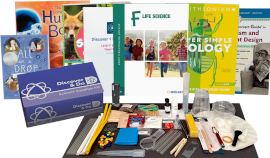Sonlight F Life Science, redone in 2024, is an excellent introduction to life science for students in grades six through eight that is aligned with the Next Generation Science Standards. Sonlight says it can also be used by ninth graders, but it is not as rigorous as most high school lab science courses. For example, the math required for the experiments is very basic and should be easy for sixth graders, and students are taught science vocabulary and repeat it in exercises but are not tested on it as they would be in most high school courses.
You can choose a program that requires either four or five days per week with a different Instructor’s Guide for each, so this is a choice you make at the time of purchase. The price for the five-day program is only slightly more, so I recommend going with that option if you’re not sure. (You can simply ignore the assignments for Fridays if time is tight.)
The course includes the Instructor’s Guide (either four- or five-day program), Level F Science Experiments by Inquisikids, Experiments Paper Packet (copies of consumable pages from the Science Experiments book), Level F Discover & Do kit, Super Simple Biology by DK Smithsonian, The Usborne Complete Book of the Human Body, The Politically Incorrect Guide to Darwinism and Intelligent Design by Jonathan Wells, All in a Drop by Lori Alexander, Ph.D. (how Antony van Leeuwenhoek invented the microscope), and a battery-powered miniature magnifier. The five-day program adds the study of nutrition with Are You What You Eat? by DK, with assignments from this book the only calendar item for Fridays.
While the kit includes a handheld magnifier, this might be the time to introduce a microscope. (Sonlight sells one along with a Microscopy Science Supplies Kit E.)
The course provides a grounding in how to think like a scientist and requires a good deal of critical thinking. The combined resources in this course provide plenty of factual information about many aspects of life science, including extended discussion of ecology, biomes, conservation, and current issues, such as sustainable food production and global warming.
In addition, the book The Politically Incorrect Guide to Darwinism and Intelligent Design leads students through an extended consideration of arguments against evolution and in favor of an intelligent designer, relying on science rather than the Bible. While the resources in the course are not Christian, the Instructor’s Guide adds occasional Christian content or has students skip problematic pages. For example, echoing the “amazingly complicated” description of the human body in The Usborne Complete Book of the Human Body, the Instructor’s Guide presents Psalm 130: 13-14 about how fearfully and wonderfully we are made. It suggests reviewing those verses with students and discussing whether all the complex parts of the body come together by chance or through God’s design. On the other hand, some sections in Super Simple Biology reflect an evolutionary point of view but don’t present significant issues. However, the Science F Instructor’s Guide skips the one page on evolutionary trees that would be problematic for creationists.
The Instructor’s Guide has weekly charts showing exactly what to do each day, including reading assignments, full-color worksheets to complete, and experiments. It includes brief notes for the teacher, answer keys, and a list of supplies needed in addition to those in the Discover & Do kit—usually household or readily obtainable items. Parents are given a list of what’s needed a week ahead so there’s plenty of time to prepare. You can purchase the program without the kit and obtain the items on your own. While some kit items like cotton balls, a coffee filter, and popcorn kernels are easy to get, others such as Benedict’s Solution, dialysis tubing, Lugol’s iodine, and lactase enzyme tablets might not be. Level F Science Experiments has a list of items in the kit for those who prefer to get those on their own, plus a separate list of other items.
Parents are encouraged to use as much of the course material as they find useful. Students don’t need to complete all worksheets or every experiment. For example, a sixth grader might not be ready to write large numbers in standard form, such as writing 6,000,000 as 6 x 106 as taught in the first chapter of Super Simple Biology and reinforced on a worksheet. There are also optional activities, such as extra research, watching videos, playing games, and doing outdoor observations. Those purchasing the five-day program might consider the Friday lessons using Are You What You Eat? optional if they run short on time. There’s lots of flexibility with this course.
In addition to worksheets from the Instructor’s Guide, students have experiment sheets to complete in Level F Science Experiments. This full-color, inch-thick book has a significant amount of teaching information along with complete instructions and recording pages. (Students can write on the Experiments Paper Packet pages rather than on the book’s recording pages.) In addition to lists of supplies at the back of the book, there are instructions for making a pH indicator from red cabbage juice.
Weekly experiments are directly related to the reading assignments. The experiments begin with a question and an observation to stimulate students’ curiosity. Students make a prediction and then carry out the experiment to see if they are correct. Parents need to be involved to help students work through this process since it is not always straightforward, but this is how they learn to think like scientists.
Aside from the experiments, students should be able to complete much of their work independently because the course is laid out with very clear directions.
Summary
Sonlight F Life Science is an outstanding course that introduces life science more broadly than usually happens in a biology course. Students learn to think like scientists and apply the scientific method. They also learn about the scientifically foundational concept of intelligent design, a topic rarely addressed elsewhere in the science curriculum.








